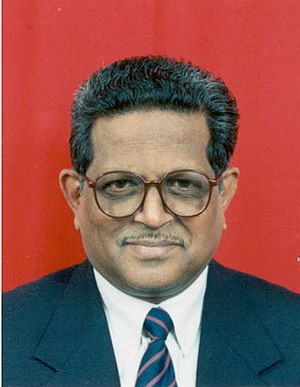S. Rajendra Babu facts for kids
Quick facts for kids
Justice S. Rajendra Babu
|
|
|---|---|

In 2004
|
|
| 34th Chief Justice of India | |
| In office 2 May 2004 – 1 June 2004 |
|
| Appointed by | A. P. J. Abdul Kalam |
| Preceded by | V. N. Khare |
| Succeeded by | Ramesh Chandra Lahoti |
| Chairman National Human Rights Commission | |
| In office 2 April 2007 – 31 May 2009 |
|
| Personal details | |
| Born | 1 June 1939 |
| Nationality | Indian |
S. Rajendra Babu was a very important judge in India. He was born on June 1, 1939. He became the 34th Chief Justice of India, which is the highest judge in the country. He also led the National Human Rights Commission of India. This group works to protect people's basic rights.
Contents
Early Life and Education
S. Rajendra Babu was born in Bangalore, India. This happened on June 1, 1939. He studied law at Raja Lakhamagouda Law College. This college is in Belgaum, which is part of Karnataka University.
A Career in Law
Becoming a Judge
Mr. Babu started his journey as a judge in February 1988. He was first appointed as a permanent judge. This was for the Karnataka High Court. Later, on September 25, 1997, he became a judge. This time, it was for the Supreme Court of India. The Supreme Court is the highest court in India.
Leading the Supreme Court
On May 2, 2004, Justice Babu became the Chief Justice of India. He was the most senior judge at that time. He took over from Justice V. N. Khare. His time as Chief Justice was short. He retired on June 1, 2004, when he turned 65.
Important Decisions
During his time in the Supreme Court, Justice Babu made many important decisions. These decisions covered different areas of law. For example, he worked on cases about civil law and criminal law. He also dealt with environmental law and tax matters. He wrote 426 judgments during his time on the Supreme Court.
One notable case involved understanding how large groups of people behave. This was in a case about events after Indira Gandhi's passing. He also explained parts of a law. This law was about protecting the rights of Muslim women after divorce.
Protecting Human Rights
After his time as Chief Justice, Mr. Babu continued to serve his country. He became the Chairperson of the National Human Rights Commission. He started this role on April 2, 2007. He held this position until May 31, 2009. He was the fifth person to lead this important commission.
After His Judicial Career
Even after retiring from being a judge, Justice Babu stayed involved. He held a special teaching position. This was at the National Law School of India University. He also had a deep interest in Vedanta, a type of philosophy. For over 25 years, he helped train people. This was for community health work. He did this as the President of the International Nursing Services Association.
Awards and Recognition
In 2005, Justice Babu received a special honor. His former university, Karnataka University, gave him an honorary doctorate. This is a high academic award.
 | Claudette Colvin |
 | Myrlie Evers-Williams |
 | Alberta Odell Jones |

